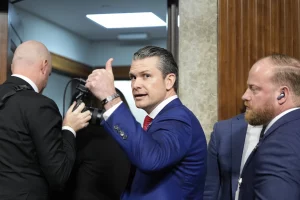China says Hegseth’s ‘threat’ claim reflects Cold War mindset

Beijing: China Sunday denounced US Defence Secretary Pete Hegseth for calling the Asian country a threat, accusing him of touting a Cold War mentality as tensions between Washington and Beijing further escalate.
The foreign ministry said Hegseth had vilified Beijing with defamatory allegations the previous day at the Shangri-La Dialogue, a global security conference. The statement also accused the United States of inciting conflict and confrontation in the region.
“Hegseth deliberately ignored the call for peace and development by countries in the region, and instead touted the Cold War mentality for bloc confrontation,” it said, referring to the post-World War II rivalry between the US and the former Soviet Union.
“No country in the world deserves to be called a hegemonic power other than the US itself,” it said, alleging that Washington is also undermining peace and stability in the Asia-Pacific.
Hegseth said in Singapore Saturday that Washington will bolster its defences overseas to counter what the Pentagon sees as rapidly developing threats by Beijing, particularly in its aggressive stance toward Taiwan.
China’s army “is rehearsing for the real deal,” Hegseth said. “We are not going to sugarcoat it — the threat China poses is real. And it could be imminent.”
The Chinese statement stressed that the Taiwan question is entirely China’s internal affair, saying the US must “never play with fire” with it. It also alleged Washington had deployed offensive weaponry in the South China Sea, was “stoking flames and creating tensions in the Asia-Pacific” and “turning the region into a powder keg.”
In a Facebook post Saturday, China’s Embassy in Singapore said Hegseth’s speech was “steeped in provocations and instigation.”
The US and China had reached a deal last month to cut US President Donald Trump’s tariffs from 145 per cent to 30 per cent for 90 days, creating time for negotiators from both sides to reach a more substantive agreement. China also reduced its taxes on US goods from 125 per cent to 10 per cent.
But it’s uncertain if a trade war truce will last. Trump, in a social media post Friday said he would no longer be “nice” with China when it comes to trade and accused Beijing of breaking an unspecified agreement with the US.
Tensions escalated anew after the US said Wednesday it would start revoking visas for Chinese students studying there.
At the Singapore forum Sunday, Philippines Defence Secretary Gilberto Teodoro scoffed at the idea that the US was the problem. His country has been involved in increasingly violent clashes with China over competing claims in the South China Sea. Teodoro said what the Chinese government saw as fair might be contrary to the norms accepted by the rest of the world.
The Chinese Embassy in Singapore later posted three Facebook posts to address Teodoro’s “groundless accusations,” arguing the South China Sea Islands are China’s inherent territories.
It said the “troublemaker” is not China, pointing to what it called recent illegal intrusions by the Philippines into the waters adjacent to two reefs. It also accused “some outside power” of posing the biggest threat to its peace with the deployment of offensive weapons and roping in allies for frequent military drills.
“Which country is coercing and bullying others, and instigating conflicts and confrontation in the South China Sea? The answer is clear to all,” it said, without naming any nation.
Separately, the Chinese Embassy in Singapore Saturday criticised attempts to link the issue of Taiwan with that of the war in Ukraine after French President Emmanuel Macron warned of a dangerous double standard in focusing on a potential conflict with China at the cost of abandoning Ukraine.
The embassy did not name Macron in its post on Facebook, but the post included a photo showing the French president at the Singapore forum.
“If one tries to denounce double standards through the lens of a double standard, the only result we can get is still double standard,” it said.
China, which usually sends its defence minister to the Shangri-La forum, this time sent a lower-level delegation led by Maj Gen Hu Gangfeng, the vice president of the People’s Liberation Army National Defence University.
AP
News